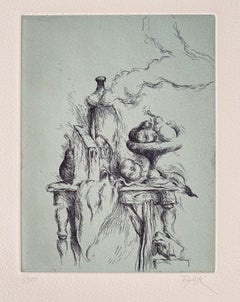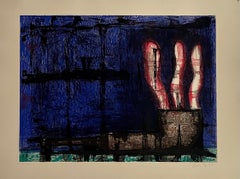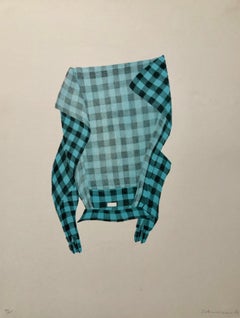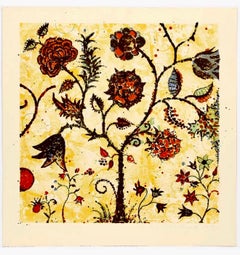Want more images or videos?
Request additional images or videos from the seller
1 of 9
Ilya SchorIlya Schor Expressionist Judaica Woodcut Shabbat Woodblock Jewish Printc.1951
c.1951
Price:$450
$500List Price
About the Item
- Creator:Ilya Schor (1904 - 1961, Polish, American)
- Creation Year:c.1951
- Dimensions:Height: 12 in (30.48 cm)Width: 10 in (25.4 cm)
- Medium:
- Movement & Style:
- Period:
- Condition:
- Gallery Location:Surfside, FL
- Reference Number:1stDibs: LU3829653932
About the Seller
4.9
Platinum Seller
Premium sellers with a 4.7+ rating and 24-hour response times
Established in 1995
1stDibs seller since 2014
1,810 sales on 1stDibs
Typical response time: 1 hour
Authenticity Guarantee
In the unlikely event there’s an issue with an item’s authenticity, contact us within 1 year for a full refund. DetailsMoney-Back Guarantee
If your item is not as described, is damaged in transit, or does not arrive, contact us within 7 days for a full refund. Details24-Hour Cancellation
You have a 24-hour grace period in which to reconsider your purchase, with no questions asked.Vetted Professional Sellers
Our world-class sellers must adhere to strict standards for service and quality, maintaining the integrity of our listings.Price-Match Guarantee
If you find that a seller listed the same item for a lower price elsewhere, we’ll match it.Trusted Global Delivery
Our best-in-class carrier network provides specialized shipping options worldwide, including custom delivery.You May Also Like
Ourisns et Lampe a Petrole, School of Paris Lithograph by Bernard Buffet
By Bernard Buffet
Located in Long Island City, NY
Artist: Bernard Buffet, French (1928 - 1999)
Title: Ourisns et Lampe à Petrole
Medium: Lithograph with pochoir
Edition: 15/300
Portfolio: Douze Aquare...
Category
1960s Expressionist Figurative Prints
Materials
Lithograph
$3,000
H 26 in W 33 in D 2 in
Dogs 2 - Contemporary Woodcut Print, Figurative, Black & white, Polish artist
By Zdzislaw Wiatr
Located in Warsaw, PL
ZDZISŁAW WIATR (born 1960)
He graduated from the Academy of Fine Arts in Cracow, at the Faculty of Graphic Arts in Katowice, where in 1986 he received a diploma with the honourable m...
Category
21st Century and Contemporary Contemporary Still-life Prints
Materials
Paper, Woodcut
$963
H 29.93 in W 22.84 in
''Hyacinth'' Contemporary Woodcut with Blue Hyacinths in interior
Located in Utrecht, NL
Vincent van Ojen is a true master of the woodcut technique. Through years of dedication and research, he has perfected this ancient medium, resulting in works of remarkable depth and...
Category
1990s Contemporary Figurative Prints
Materials
Woodcut
$1,050
H 35.83 in W 28.35 in D 0.79 in
John E. Billmyer, Flower Piece, WPA wood engraving
Located in New York, NY
'Flower Piece' shows the artist, John Billmyer, to be a highly accomplished wood engraver. There are endless patterns and created details -- all executed flawlessly. Mostly made up o...
Category
Mid-20th Century American Modern Figurative Prints
Materials
Woodcut
Henry Spanner, Beer
Located in New York, NY
This is among the very few prints known by Spanner. It's the epitome of joie de vivre. It is signed, numbered, and annotated 'Hand print,' in pencil. The numbering indicates an edit...
Category
1930s American Modern Figurative Prints
Materials
Woodcut
Untitled, from the Art Against AIDS Portfolio
Located in New York, NY
Gael Stack
Untitled, from the Art Against AIDS Portfolio, 1988
Woodcut on paper with deckled edges. Hand signed. Numbered. Printer's and Publisher's Blindstamp. Unframed.
Hand signed and numbered on the lower recto (front) with printer's and publisher's blindstamp. Edition 38/50
20 × 15 inches
Publisher
Little Egypt Enterprises, Houston, TX
Provenance
Art Against AIDS Portfolio, numbered 38/50
This beautiful limited edition woodcut by Gael Stack was published in 1988 as part of the Art Against Aids portfolio, numbered 38/50. Superb provenance as it is was acquired from the original Art Against AIDS Portfolio published in Houston, Texas. This will be the first time the work will be removed from the portfolio. The late 1980s was the height of the AIDS epidemic, and this was one of many efforts by the creative community to raise funds to assist in fighting this deadly scourge that disproportionately affected the artistic community.
Measurements:
20 x 15 inches (sheet)
8 1/4 x 12 inches(image)
The complete Art Against AIDS Portfolio is comprised of 10 prints, in black and white and color, from 10 artists.
About Gael Stack:
Gael Stack is a Texas painter. She lives in Houston and has work in the permanent collections of several museums. Stack has worked as a professor at the University of Houston...
Category
1980s Contemporary Figurative Prints
Materials
Woodcut, Pencil
Apple and Lemon
By Roy Lichtenstein
Located in Palo Alto, CA
Roy Lichtenstein Apple and Lemon, 1983 is an excellent example of the artist’s later work. Lichtenstein largely abandoned his famous comic strip pan...
Category
1980s Pop Art Still-life Prints
Materials
Handmade Paper, Woodcut
"Tending to a Perishing Bloom", Figurative, Dark Romanticism, Relief Print
Located in Philadelphia, PA
This piece titled "Tending to a Perishing Bloom" is an original print by Samantha Mendoza and is made by woodcut relief. This piece measures 38"h x 26...
Category
21st Century and Contemporary Contemporary Figurative Prints
Materials
Ink, Woodcut
A Hebrew nomadic camp – English School, 18th century
Located in Middletown, NY
Engraving on light weight laid paper with an small indiscernible, alphabetic watermark, 9 x 7 1/2 (230 x 188 mm); sheet 11 1/4 x 8 1/2 inches (284 x 215 mm), wide margins. In very go...
Category
18th Century Old Masters Figurative Prints
Materials
Ink, Handmade Paper, Laid Paper, Woodcut
Chrysanthemums and the Rising Moon
By Suzuki (Hozumi) Harunobu
Located in Middletown, NY
An image that originally appeared in an astrological calendar for the year 1766.
Tokyo: Shuei-Sha, 1766. Woodblock print in colors printed on laid mulberry paper, 10 3/4 x 7 7/8 in...
Category
Mid-18th Century Edo Still-life Prints
Materials
Watercolor, Handmade Paper, Woodcut
More From This Seller
View AllSamuel Bak Surrealist Etching Israeli Bezalel Artist "Hidden Pear", Fruit Bowl
By Samuel Bak
Located in Surfside, FL
HIDDEN PEAR, color etching, signed in pencil, numbered 7/50, Jerusalem Print workshop blind stamp, image 7 ½ x 5 ½”, sheet 15 x 10 ¼”.
Samuel Bak (born 12 August 1933) is a Polish- American painter and writer who survived the Holocaust and immigrated to Israel in 1948. Since 1993, he has lived in the United States.
Samuel Bak was born in Wilno, Poland, Bak was recognized from an early age as having an artistic talent. He describes his family as secular, but proud of their Jewish identity.
By 1939 when Bak was six years old, the war began and Wilno was transferred from Poland to Lithuania. When Wilno was occupied by the Germans on June 24, 1941, Bak and his family were forced to move into the ghetto. At the age of nine, he held his first exhibition inside the Ghetto. Bak and his mother sought refuge in a Benedictine convent where a Catholic nun named Maria Mikulska tried to help them. After returning to the ghetto, they were deported to a forced labour camp, but took shelter again in the convent where they remained in hiding until the end of the war.
By the end of the war, Samuel and his mother were the only members of his extensive family to survive. His father, Jonas, was shot by the Germans in July 1944, only a few days before Samuel's own liberation. As Bak described the situation, "when in 1944 the Soviets liberated us, we were two among two hundred of Vilna's survivors--from a community that had counted 70 or 80 thousand." Bak and his mother as pre-war Polish citizens were allowed to leave Soviet-occupied Wilno and travel to central Poland, at first settling briefly in Lodz. They soon left Poland and traveled into the American occupied zone of Germany. From 1945 to 1948, he and his mother lived in Displaced Persons camps in Germany. He spent most of this period at the Landsberg am Lech DP camp in Germany. It was there he painted a self-portrait shortly before repudiating his Bar Mitzvah ceremony. Bak also studied painting in Munich during this period, and painted "A Mother and Son", 1947, which evokes some of his dark memories of the Holocaust and escape from Soviet-occupied Poland. In 1948, Bak and his mother immigrated to Israel. In 1952, he studied art at the Bezalel Academy of Arts and Design in Jerusalem. After serving in the Israel Defense Forces, he continued his studies in Paris (from 1956 at the École nationale supérieure des Beaux-Arts) and spent various periods of time in Rome, Paris, Switzerland and Israel before settling permanently in the United States. In 2001, Bak returned to Vilnius for the first time and has since visited his hometown several times. Samuel Bak is a conceptual artist with elements of post-modernism as he employs different styles and visual vernaculars, i.e. surrealism (Salvador Dali, Rene Magritte), analytical cubism (Picasso), pop art (Andy Warhol, Roy Lichtenstein) and quotations from the old masters. The artist never paints direct scenes of mass death. Instead, he employs allegory, metaphor and certain artistic devices such as substitution: toys instead of the murdered children who played with them, books, instead of the people who read them. Further devices are quotations of iconographical prototypes, i.e. Michelangelo's "Creation of Adam" on the Sistine Ceiling or Albrecht Dürer's famous engraving entitled "Melencholia" . In the late 1980s Bak opened up about his paintings, stating they convey “a sense of a world that was shattered.” He turns these prototypes into ironical statements. Irony in the art of Samuel Bak does not mean parody or derision, but rather disenchantment, and the attempt to achieve distance from pain. Recurring symbols are: the Warsaw Ghetto Child, Crematorium Chimneys or vast backgrounds of Renaissance landscape that symbolize the indifference of the outside world. These form a disturbing contrast with the broken and damaged images in the foreground. Samuel Bak's paintings cause discomfort, they are a warning against complacency, a bulwark against collective amnesia with reference to all acts of barbarism, worldwide and throughout the ages, through his personal experience of genocide.
In Bak's piece entitled Trains Bak creates a vast grey landscape with large mounts creating the structure of a train. Massive taper candles burn in the distance further down the train tracks, surrounding an eruption. The smoke from the candles and volcano pour into a sky of dark ominous clouds that lurk over the landscape. Here Bak has created a whole new meaning for “trains.” Many of Bak’s pieces incorporate aspects of Jewish culture and the holocaust with a dark and creative twist, such as Shema Israel...
Category
20th Century Surrealist Figurative Prints
Materials
Etching
Boston Modernist Color Etching Smoking Pipe Aaron Fink Pop Art Print Americana
By Aaron Fink
Located in Surfside, FL
Aaron Fink (American, b. 1955)
Etching on paper titled "Untitled (Colored Pipe),"
Depicting an abstracted pipe with bright pink smoke floating from the bowl.
Hand signed in pencil...
Category
1980s Contemporary Figurative Prints
Materials
Etching
Untitled Still Life Hanging Plaid Shirt, Figurative Poetry Lithograph
Located in Surfside, FL
Signed, numbered and dated limited edition lithograph print. The number might not match the photo as I had more than one.
George Schneeman (March 11, 1934 – January 27, 2009) was an...
Category
1980s American Modern Figurative Prints
Materials
Lithograph
Modernist 1998 Flowering Tree Color Lithograph Dan Rizzie Mod Collage Artist
By Dan Rizzie
Located in Surfside, FL
Rizzie, Dan (American, born 1951)
Flowering Tree
1998
Lithograph printed in colors on wave paper,
Hand signed in pencil, dated, and numbered 6/25,
unframed
Provenance: acquired fro...
Category
1990s Abstract Figurative Prints
Materials
Paper, Lithograph
Large Donald Saff Surrealist Pop Art Aquatint Etching Bee, Chair, Pot
By Donald Saff
Located in Surfside, FL
Artist: Donald Saff
Medium: Etching with Aquatint, Hand signed and numbered in pencil
Donald Jay Saff (born 12 December 1937) is an artist, art historian, educator, and lecturer, sp...
Category
1980s Pop Art Figurative Prints
Materials
Etching, Aquatint
Zen Minimalist Flowers Etching American Modernist Ed Baynard Pop Art Print
By Ed Baynard
Located in Surfside, FL
ED BAYNARD (American, 1940-2016)
Flowers, Flowers in a Vase, Etching.
1979/1980,
Hand signed, dated l.r.,
Hand numbered from small edition 12/24,
Dimensions: 23 by 19 in. Framed 25 by 21 in
Born in Washington, D.C. in 1940. Raised in Washington, D.C. and newly graduated from high school, he flew to Europe living off and on in Paris and London. During this time, he designed costumes for Jimi Hendrix, worked as a graphic designer for the Beatles as well as Elizabeth Taylor and Richard Burton. Returning to New York, he dedicated his life to art after a surprise success with his first show in 1971 at the Willard Gallery in NYC. Ed's images are Zen-like in their simplicity and grace rendered in a flat, graphic style that recalls Japanese Ukiyo-e prints. His watercolors are luminous, like the rest of his representations regardless of the medium. The Japanese inspired ukiyo-e style woodblock prints and lithograph works he created at Tyler Graphics in 1980 contain a 20th century "floating world" sensibility. Ed's wish was to bring harmony, color, and a meditative stillness to this chaotic planet. He did so in a gentle and powerful way, always as an expression of his deep gratitude for the love and beauty, friendship, and concerns he held dearest. His first solo exhibition was in 1971 at New York's legendary Willard Gallery on the recommendation of Agnes Martin. Baynard went on to have exhibitions at galleries including Betty Parsons Gallery, New York (1973); Marian Goodman Gallery, New York (1977); John Berggruen Gallery, San Francisco (1980); and Barbara Gladstone Gallery, New York (1980/81).. Baynard manages to retain a simplicity of form inspired by a love of Japanese Woodblock prints. His new works reflect the same poetry of his earlier paintings, retaining his stylized compositions with their Zen like minimalism and Oriental calm, along with a new sense of rhythm and movement. Baynard uses familiar themes such as flowers, plants, pots, and vases, incorporating them into his delicate watercolor still lifes, thus creating stunning visual feasts. He was included in the 1972 Landscape exhibition at MoMA NY alone with other luminaries James Boynton...
Category
1980s American Modern Still-life Prints
Materials
Etching
Recently Viewed
View AllMore Ways To Browse
Judaica Jewelry
Vintage Circus Train
Vintage Dominatrix
Vintage Native American Dress
Vintage Ocean Painting
Vintage Posters Alo
Vintage Woodstock Poster
Weinmann Aloe
Whale Lithograph
William Yorke
Woodstock Poster
19th Century Paintings Of Cavalier King Charles Spaniels
1980s Gallery Posters
7 Deadly Sins
A O Smith
Andy Warhol Joseph Beuys
Angela Davis
Art Africain



